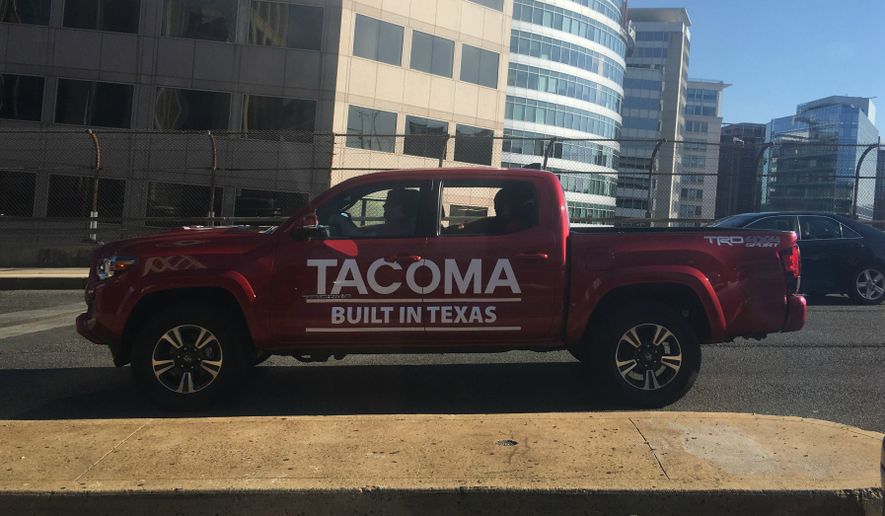Auto workers protested President Trump’s proposed tariffs on imported auto parts Thursday, ahead of the Department of Commerce’s hearing on the issue.
Earlier in the morning, several Toyota cars were seen driving past the Capitol. One driver was seen holding a sign out of the car window that read, “tariffs are taxes.
The protest was organized in part by the Global Automakers Association, of which Toyota is a member.
National Manager and Strategic Communications & Media Relations boss for Toyota in Washington Ed Lewis said the protest is “in opposition to the threat to impose a 25 percent tariff on imported vehicles and parts.”
Tomorrow #American auto workers, along with @SenDougJones, @RepDrewFerguson, & @RepWalorski will be holding a ‘Drive-In’ to showcase how #tariffs will negatively impact U.S. #auto manufacturing. Read the full advisory here: https://t.co/682obtKOd9 #DontTaxMyRide pic.twitter.com/LGzKL5eQDP
— Here For America (@HereforAmerica) July 18, 2018
Democratic Sen. Doug Jones of Alabama and Republican Reps. Drew Ferguson of Georgia and Jackie Walorski of Indiana were present at the demonstration alongside workers to comment on how the tariffs would affect their communities.
“Because at the end of the day, tariffs are taxes. And what the administration is trying to do today is impose new taxes on the American people,” Mr. Jones said in his speech at the rally.
“While we need to ensure a level playing field with America’s trading partners, imposing costly tariffs on this vital industry would threaten our economic momentum and put manufacturing jobs at risk,” Ms. Walorski said, according to a press release.
At the hearing, CEO of Global Automakers John Bozzella testified to the necessity of free trade for the auto industry’s success. He said there is no national security reason that would justify the tariffs.
Mr. Bozzella told The Washington Times that he was concerned that some auto companies may move overseas if pressure from the tariffs becomes too great.
“Higher prices means less demand for vehicles. Less demand for vehicles will mean less will mean less production. And less production will mean fewer jobs,” he said, “So if we have barriers to trade to seek markets outside the U.S. then I do believe auto production will go elsewhere. It’s a global market. Every car company is a global car company.”
Harley Davidson Inc. was one of the first companies to move some production overseas in response to the president’s new wave of tariffs, specifically ones targeting steel and aluminum. The motorcycle company left because of retaliatory tariffs from the European Union.
Mr. Trump slammed the company after the move, accusing them of using the tariffs as a cover.
Mr. Bozzella praised the president’s other economic efforts, explaining that tax cuts and “cutting the red tape” has helped the industry. However, he said he hoped the administration would change course and “get to a period where we can negotiate more opportunities to export from the United States to countries around the world.”
The complaints of autoworkers were joined by those from foreign dignitaries also testifying at the Commerce Department’s hearing.
Ambassadors from the EU, Mexico, Canada and Turkey sat on a panel testifying to the benefits of auto trade between their nations and the U.S. All denounced the suggestion that auto trade relations are a threat to national security.
On Monday, the U.S. filed five separate disputes with the World Trade Organization against all of the nations represented on the panel as well as China. The complaints claim that retaliatory tariffs placed on the U.S. by the five countries violate international law.
“Frankly the notion that the import of autos and auto parts from your closest allies could threaten U.S. national security is, bluntly speaking, absurd,” EU Ambassador David O’Sullivan said.
Both the EU and Canada pledged to respond with retaliatory measures as they did with the U.S. tariffs on steel and aluminum in June.
The president has continued his hard-line rhetoric towards traditional trade allies, especially the EU, this week. He described the EU as a “foe” in a recent interview and has continuously accused them of taking advantage of their trade relationship with the U.S.
Senators on both sides of the aisle have spoken out against Mr. Trump’s approach to trade negotiations. On Wednesday, the Senate passed a nonbinding resolution as a step towards giving Congress a stronger role in tariffs.
• Gabriella Muñoz can be reached at gmunoz@washingtontimes.com.
• Alex Swoyer can be reached at aswoyer@washingtontimes.com.




Please read our comment policy before commenting.